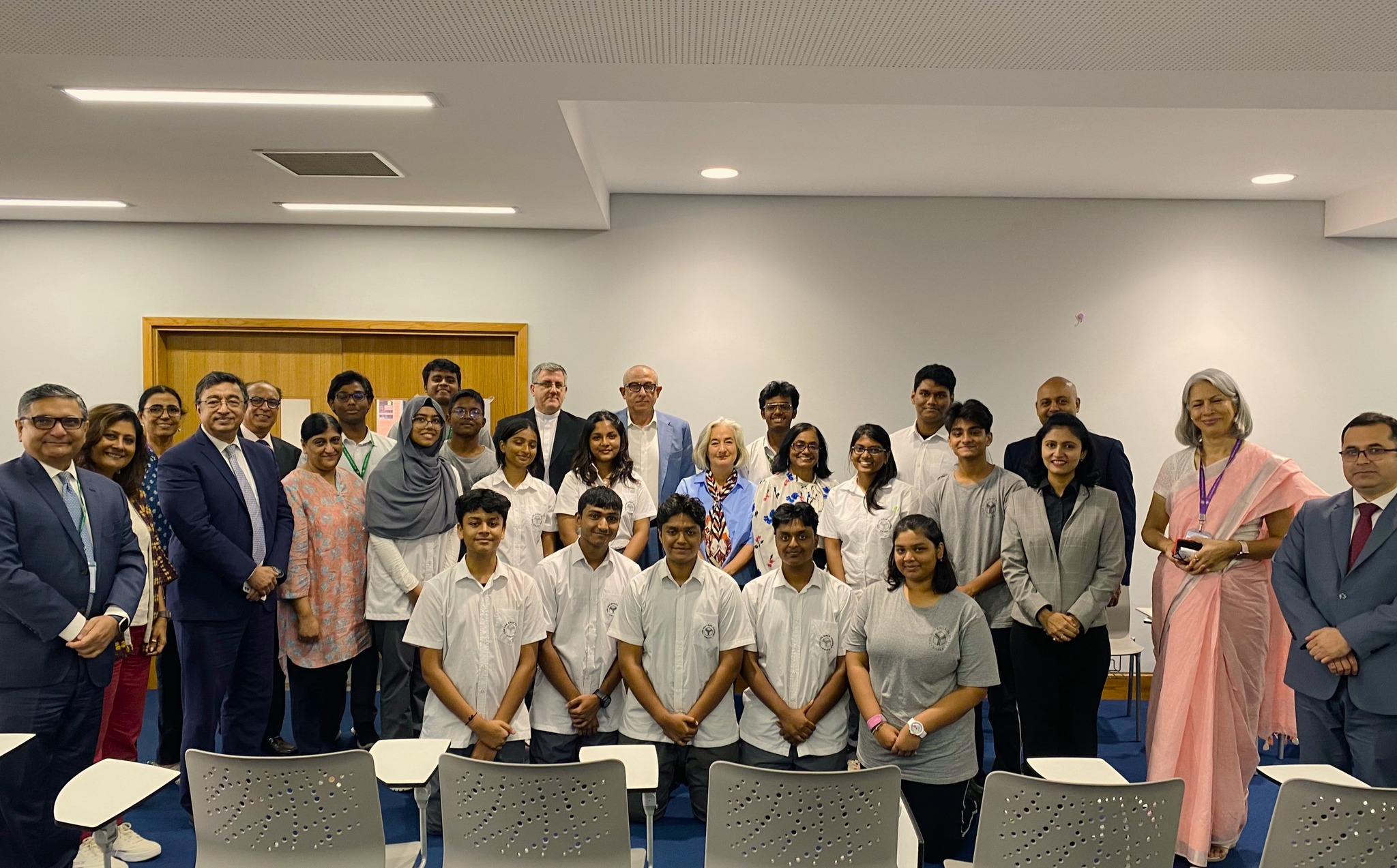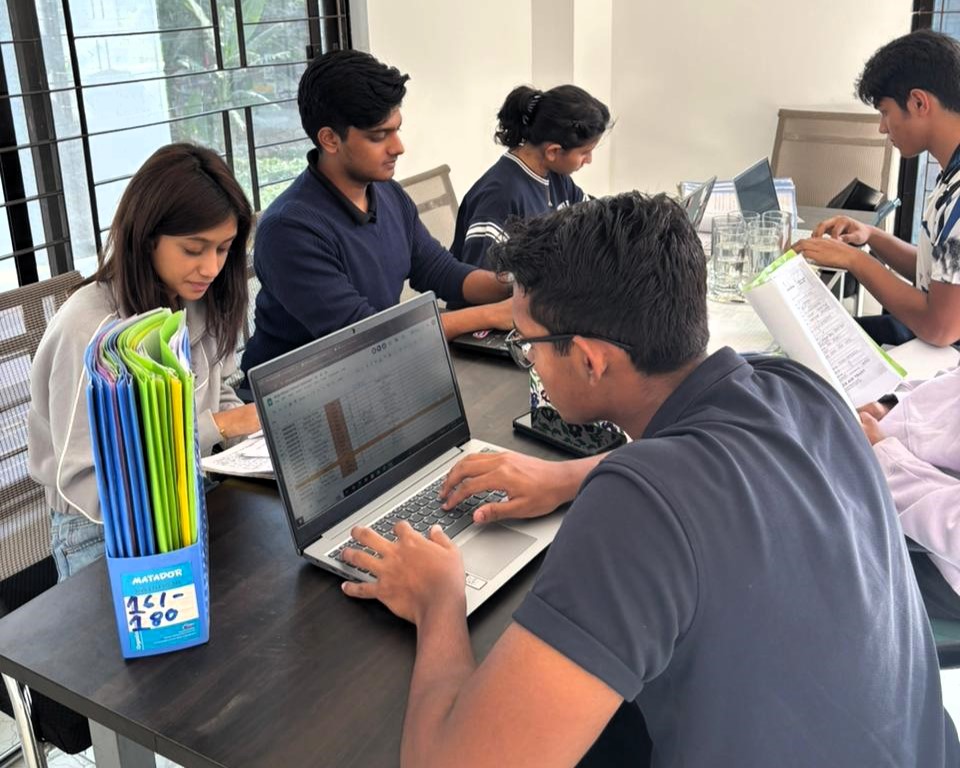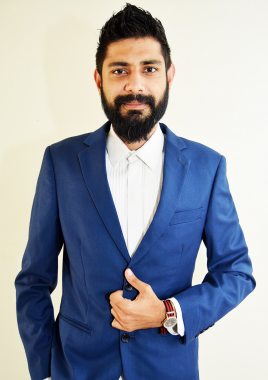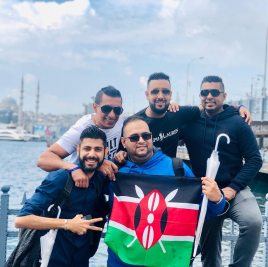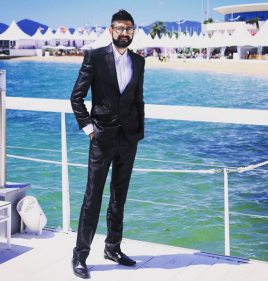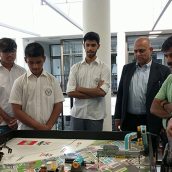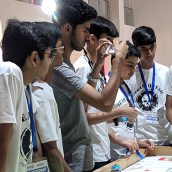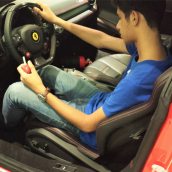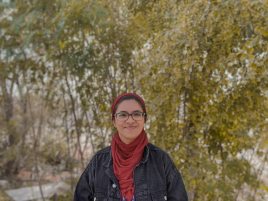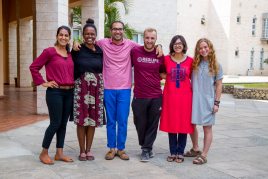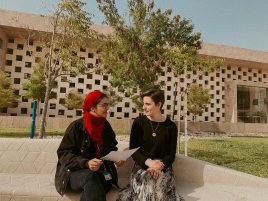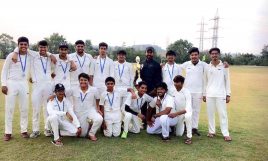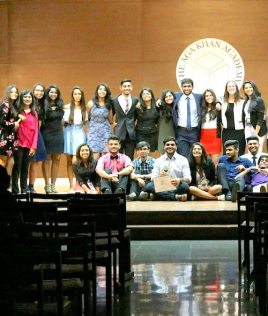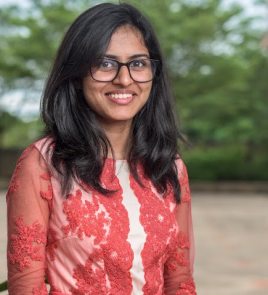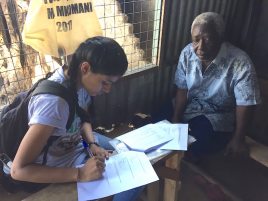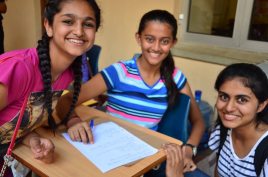Hussein Jiva (Class of 2009): A citizen of the world
Hussein Jiva graduated from the Aga Khan Academy Mombasa in 2009 after what he feels was a transformative journey.
If he is adamant about one thing, it is the notion that having an open mind allows for an individual’s personal and professional growth. The willingness to consider new ideas and listen to people whose thoughts may be different from one’s own allows one to embrace new possibilities to solve societal problems.Originally a resident of Mombasa, Hussein says it was his time at the Academy that forced him to examine his old thinking and rewrite a new chapter in his life.
“I remain a proud alumnus of the Aga Khan Academy Mombasa,” he states unwaveringly. “Given that the institution has had a huge impact in shaping my formative years.” Convinced that the Academy’s International Baccalaureate (IB) curriculum played a key role in his growth and personal development, he postulates it is the rigor of the curriculum that made him the person he is today.
“The IB curriculum education provided me with a well-rounded experience, anchored by values such as diversity, ethics, pluralism, leadership and open mindedness. On a social and cultural front, the pluralistic approach to education embraced by the Academy provided a strong foundation for me to build upon. It helped me in my journey to greater cultural understanding and tolerance, as I grew to appreciate differences in people from various backgrounds.”Hussein has a Bachelor’s Degree in Journalism and is currently pursuing a Master’s Degree in Communication Studies, with a focus on Digital Media at the United States International University–Africa in Nairobi.
Ruminating about his years at the Academy, Hussein recently spoke about how the Academy places enormous importance on its public service curriculum requisite. He feels this requirement gives students a higher purpose in life a belief that they can make a difference in the communities in which the live. Hussein’s cosmopolitan citizen-of-the-world way of thinking was borne out of this requisite.
“I recall participating in creativity, activity, service projects, one of the prerequisites to graduate from the Academy. On the surface, the concept is but a mere requirement. However, the esoteric essence of the practice provides for the development of a well-rounded individual who would ultimately contribute to the betterment of society beyond the academic sphere.”
As a journalist, Hussein has covered various local and international events including the Cannes International Film Festival from 2013 to 2016, the International Indian Film Academy Awards in 2017 and 2018 and the ICC Cricket World Cup in 2015 and ICC World T20 2016. He has also reported on momentous occasions such as Pope Francis’s visit to Kenya in 2015 and the Indian Prime Minister Narendra Modi’s visit also to Kenya in 2016.In addition, for almost eight years, Hussein worked at The Asian Weekly, a publication based in Nairobi with an East African circulation. He contributed to the Weekly as a Writer, Photographer and Sub-Editor. He later led the Sports Desk, and covering sports remains his passion.
“Sports commentary has been my area of interest, with football dominating my preferences. As such, I have written on both local and international sports, for media outlets beyond Kenya. My work has been published on portals in Nigeria, the United States and the United Kingdom. I have also been on a local television football show as a guest commentator.”
Asked what he would like to see happen in societies to make them more stable and better functioning, Hussien stated,
“Let us become instruments of change and alter the realities we face; let not challenges be viewed as obstacles to success but stepping stones toward it. After all, when you change the way you look at things, the things you look at will ultimately change.”
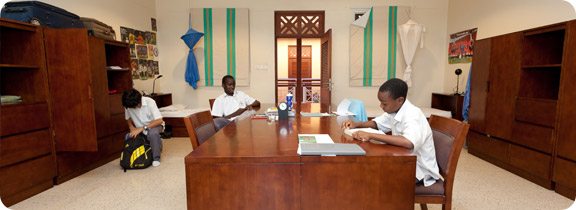
Residential Campus calendar
Please note these dates are subject to change. More specific, programme related information will be given as it becomes available.
| Date and Event | Notes |
| August 19, 2011 after 4:00pm Move-in day for new residential students |
Students move-in, accompanied by parent. Parents can stay the night in Mombasa and come back to campus on Saturday for breakfast. Parents depart after lunch. |
| August 20, 2011 before 6:00pm Move-in day for returning students |
Students to return to The Academy. Parents are encouraged to drop off their child and meet their new Dorm Parent. |
| September 6, 2011 Senior School Prize Giving |
On the 6th, awards ceremony at 2:45pm for Senior School students to recognize outstanding achievements from the 2010/2011 academic year. Parents are welcome to attend. |
| October 14-15, 2011 Parent-Teacher Conference and last day of school before mid-term |
Parents are highly encouraged to attend the Parent-Teacher conference during the day. Students are able to go home for the mid-term after meeting respective teachers. If parents do not attend, students still need to meet their teachers. Students will be able to leave for holidays only after meeting with teachers. Students are also able to remain on campus for the holiday. |
| October 23, 2011 Mid-term ends |
Students are required to report to school by 6pm. |
| December 9, 2011 Last day of school before December holidays |
Students are able to leave for holidays after 1:30pm. Please arrange flights after this time. The Academy officially closes on Saturday, December 10 after lunch. |
| January 3, 2012 December holidays end |
Students are required to report to school by 6pm. |
| January 6, 2012 Move-in day for new residential students |
Students move-in, accompanied by parent. Parents can stay the night in Mombasa and come back to campus on Saturday for breakfast. Parents depart after lunch. |
| February 15, 2012 Last day of school before mid-term and residential camp |
Students may leave after 4pm. Please do not make transport arrangements departing earlier than 5:30pm. Students may remain on campus for the holiday. For students in Years 6-8, the residential community goes on an expedition. The camp is mandatory for all students in Years 6-8 and is optional for older students. The cost of the trip is Ksh 10,000/student. |
| February 19, 2012 Mid-term ends |
Students are required to report to school by 6pm. |
| March 29-30, 2012 Parent-Teacher Conference and last day of school before April holidays |
Parents are highly encouraged to attend the Parent-Teacher conference during the day. Students are able to go home for the mid-term after meeting respective teachers. If parents do not attend, students still need to meet their teachers. Students will be able to leave for holidays only after meeting with teachers. Students are also able to remain on campus for the holiday. The Academy officially closes on Saturday, March 31 after lunch. |
| April 15, 2012 Easter holiday ends |
Students are required to report to school by 6pm. |
| June 22, 2012 Last day of school |
Students must clear with the Dorm Parent before they may leave. School ends at 12pm. Please do not arrange any transport before 4pm as students need to clear their belongings. |
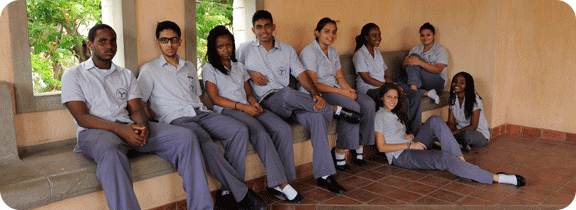
Quick Facts about the Academy
The Aga Khan Academy Mombasa (established 2003)
Location: Kizingo area of Mombasa Island
Campus size: 18 acres of land; campus design inspired by local Swahili architecture
Curriculum
The Aga Khan Academy Mombasa is an International Baccalaureate (IB) World School
IB programmes:
- Primary Years Programme: years 1–5
- Middle Years Programme: years 6–10
- Diploma Programme: years 11–12
Aga Khan Curricular Strands, implemented across the curriculum:
Ethics, Pluralism, Cultures (with an emphasis on Muslim civilisations), Governance and Civil Society, and Economics for Development
Staff and students
Faculty numbers: 7 senior management, 70 Senior School faculty, 27 Junior School faculty, 104 administrative staff
Number of students currently enrolled: 687 day and residential students in total: 181 day students in the Junior School; 506 day and residential students in the Senior School, with 270 in residence
Numbers of students and teachers at full capacity: 750 students and 90 teachers, with over 30% of students receiving some form of financial aid
First IB Diploma Programme graduating class: 2007
Residential students
Number of residential students: 270 currently, with full capacity of 300 students
Number of students per room: Between 1 and 4, with second year Diploma Programme students in single or double rooms
Residential facilities: Student lounge with large-screen television, study areas, laundry facilities, dining hall
Campus facilities
Sports facilities: 25-metre swimming pool, diving pool, full-sized sport field, Astroturf field, gym,
three regulation-sized basketball courts, cricket pitch, tennis courts, squash courts, badminton court, volleyball court, netball court and junior play area
Arts facilities: Rooms for fine arts, music, dance; individual music practice booths; music recording area; amphitheatre performance space
Academic areas: Junior School classrooms, Senior School classrooms, science and computer laboratories, multiple-award-winning library and resource centre, arts facilities, music and dance studios
Residential buildings: Six residential blocks: three male and three female; 4–6 dorm parent apartments in each block. Each block has a central atrium, lounge area, ocean view, patio and laundry facilities
Technology: The Aga Khan Academy Mombasa has been named a Microsoft Showcase School, the only school in East Africa to receive this designation
Professional Development Centre
The Aga Khan Academy Mombasa is home to a Professional Development Centre for the advancement of teachers. The primary objective of this centre is to provide professional development that will benefit the wider school system in Kenya.
Programming began in June 2010 with a Professional Learning for Educators Series for teachers in local government, independent and not-for profit schools.
Through the Microsoft Showcase Schools programme, the Aga Khan Academy Mombasa shares ideas globally and supports other schools in Kenya to improve learning and student outcomes through technology.
The Aga Khan Academies network
18 Academies are planned in South and Central Asia, Africa and the Middle East.
3 Academies are currently operating: Mombasa, Kenya (opened 2003); Hyderabad, India (opened 2011); and Maputo, Mozambique (opened 2013).
When complete, the network will represent 2,000 teachers and 14,000 students (boys and girls), with 1,400 graduates annually.
Institutional partnerships include:
Agencies of the Aga Khan Development Network; universities including Harvard, Oxford, Toronto and University of California, Los Angeles; secondary schools including Phillips Academy, Andover, USA and Schule Schloss Salem, Germany.
Ali Nilgiriwala - racing champion and journalist in the making
At the FIRST Lego League robotics challenge held in Bangalore in February 2017, the Aga Khan Academy’s team Queso won the Best Project award. Ali, the assistant coach for team Queso, was moved by his team’s hard work and determination. Ali was also the assistant coach for team Maverick as well, and both his teams scored very well. “We were happy that we got a mentor like Ali,” says Alyque Farishta, captain of team Queso. “He is fun, intelligent and also extremely supportive.”
Ali wants to go on to race professionally, but his ambitions don’t end at the chequered flag. His greater ambition is to own a GT3 racing team. “Team management or ownership is the path to stay involved in the industry long term,” he says.
Aleesha Suleman (Class of 2012): Dedicated and determined
At UCL- Qatar, Aleesha is completing a Master of Arts Degree programme in Museum and Gallery Practice. This programme, Aleesha says, “brings together my many loves – art, museums, culture, education, development and social justice.”
Aleesha also has a Bachelor of Science degree in Foreign Service from Georgetown University in Qatar. She notes that whenever she was studying, she never lost sight of her connection to Kenya.
“For one, whatever classes I took, I would find ways to connect my research back to Kenya, its history, its politics and its socio-economic issues. University classes related to the African continent would light a spark in me that made me realise how passionate I was about making a positive social change to the continent in whatever way I could,” she states.
Being admitted to the Academy was the beginning of a transformative journey for Aleesha. Coming from a more conservative background, it was a culture jolt initially. “I distinctly remember feeling the shock of a co-ed classroom for the first time and feeling like I would never be comfortable in the Academy’s school uniform.”
However, as Aleesha began to be exposed to a plethora of experiences, she adjusted quickly to her new life. She engaged in a number of extracurricular activities, including singing and playing musical instruments for the school band, hiking and mountain climbing through the President’s Award Programme. She also took on a leadership role within the growing residential programme as a Dorm Captain.
Following her graduation from Georgetown University, Aleesha returned to AKA Mombasa to become an Academy Fellow for two years. During this time, Aleesha worked as a mentor and residential parent to students, while also working in the Communications Department. Once her fellowship ended, Aleesha became the Communication Department’s official Communications Officer.Always a champion of social enterprise and progress, Aleesha started an organisation called Kreatives Konnect when she became a part of the Academy staff. The focus of the organisation is to provide opportunities for creatives in the coastal city of Mombasa to showcase their talents, network and collaborate with others, while also co-creating opportunities for development. Not only did the staff at the school back her in this endeavour, but the Academy students and the wider AKA community also helped her make this vision a reality.
“It made me feel very privileged to be part of such a community,” Aleesha recalls proudly. “I realised that just as the Academy supports students in making their ideas come to life, the school also supports all projects that impact the broader society.”
What does Aleesha envision she will do for Kenya?
“My long-term goal is to build high quality, accessible creative spaces in Kenya, specifically in my hometown of Mombasa. I hope to establish start-ups around this idea, incorporating the ground-work already started through Kreatives Konnect.”
A firm believer in the power of good art bringing about social change and moving communities forward, Aleesha says her goal is to work with artists to raise the level of development of the country in a sustainable manner. “I would like to work on creating cultural policy and instituting cross-cultural collaborative programs that would revolutionise the creative industry, not just at a local level in Mombasa, Kenya, but also at a regional and international scale.”
Aleesha recently worked on an interactive online exhibition with her Museum and Gallery Practice colleagues. It is titled Umoumah: Becoming a Mother and takes the visitor on a journey through pregnancy and motherhood, especially focusing on how the mother can be supported by loved ones and most importantly, herself. Aleesha sees this project as a crucial learning experience in how support and positive social change can be achieved through digital platforms. “Especially now with COVID-19, we’re all having to find alternative ways of communicating and connecting with others, and having a fully online exhibition is simply a testament to that. It opens up a lot more cross-border avenues for the future that transcend physical constraints.”Aleesha has fondly come to regard the Academy as her second home. Reminiscing about her period at the Academy, she offers a bit of advice to current Academy students.
“Be highly proactive. Do your research. Learn about yourself. Keep your options open and stop letting other people define the next steps of your life. Don’t be lazy about this process because it defines the next few years of your life. No one is going to just hand you things – you have to work for it. There are lots of amazing young people around the world who are deserving (especially if you’re looking for scholarships) You have to show the admissions team why you are unique, but there has to be evidence to show this. This evidence comes through your active and consistent participation in the activities and causes you truly care about.”Kelvin Bagthariya: Generating positive change with resilience
Kelvin Bagthariya, a second-year Diploma student at the Aga Khan Academy Hyderabad, believes that his time at the Academy has taught him one thing in particular: resilience. Kelvin joined the Academy in year 9, and having come from a small town in Gujarat, it was a completely different environment. He believes the Academy has changed his mindset, teaching him to become independent, improving his self-esteem and allowing him to pursue his passion to make a change in his community.
“It was hard for me in the ninth grade as I grew up in a conservative society where people had closed mentalities and viewed life with confined perspectives – it was totally opposite when I came [to the Academy]. I was surrounded by people from diverse communities, with different perceptions and different approaches towards learning. Coming here to the Academy made me adapt to the pluralistic environment, helped me overcome new challenges and integrate [His Highness’s] vision towards my learning.”
For Kelvin, the attitude and assistance of the staff, teachers and his peers at the Academy were the reasons behind his resilience through this tough transition, especially in adjusting to a new way of learning and thinking. They were extremely encouraging towards Kelvin, which empowered him to take responsibility, get involved in enrichment activities and take on leadership roles.
“The journey has [inspired] many transformations in me since I joined. If I recall my first day [at the Academy], everything was new to me. I felt I wouldn’t be comfortable or accepted, and the first few months were lonely. But what the Academy has taught me is that you have to be independent. The Academy offers various opportunities from sports, service projects and various events. …Throughout my journey, being part of the school cricket team, participating and leading various service projects, being head of logistics in Model United Nations, summer internships, school trips and participating in cultural events has shaped me as an individual. It is very different from other schools. The journey wasn’t easy and couldn’t have been possible without my peers, teachers and assistance staff. After four years, if I look at myself, it is a proud moment for me.”
During his four years at the Academy, Kelvin has particularly enjoyed being part of the cricket team, Model United Nations, initiating the organic farming project at the Academy and doing a summer internship with the Aga Khan Foundation. Kelvin explains, “Enrichment activities give you a taste of real life and how it works.”
Through these enrichment activities and involvement in the community at the Academy, Kelvin was encouraged to contribute to the community in his hometown. “I am very passionate about bringing change in the society. When I see a problem, I want to make a change. I have the passion to be a leader and take responsibility. I always want to take initiative.”
Kelvin has taken initiative on an issue close to his heart and one of most pressing public health issues in his hometown: tobacco addiction. Kelvin lost a close friend to tobacco addiction, so he decided to partner with institutions in the Ismaili community such as the Aga Khan Education Board and the Aga Khan Youth and Sports Board to run a campaign to inform people about the consequences of addiction through a short movie that he scripted and acted in. He also created a youth group, worked with families struggling with addiction, visited schools and vulnerable areas, and organized health checkups. The project even received an award from the local government for its effort to mitigate tobacco addiction.
“I felt proud when 15-20 people came to me and said they are no longer addicted,” Kelvin shares.
Kelvin owes his enthusiasm to take initiative to the Academy, where he had always been motivated to do the same through his CAS and enrichment activities.
After graduating from the Academy, Kelvin wishes to pursue a degree in computer science in Canada. He hopes to use his education to work for the good of society, in particular for the Aga Khan Development Network and in the direction of His Highness the Aga Khan’s vision of improving the quality of life of people.
“His Highness says when you leave the Academy, you should be working for change in your own community. I have the responsibility as a global citizen to make a change””
By Inaara Gangji
Kamila Janmohamed (Class of 2018): Reflecting on immense personal growth
My four-year journey at the Aga Khan Academy Mombasa came to a close at a much faster pace than I am comfortable with. With graduation having recently taken place, I can’t help but look back at the immense growth I have undergone personally, socially and intellectually during my time here.
The prospect of joining the Academy had always sat passively on the horizon – I had cousins pass through the Diploma Programme here long before me, and a sister who soon planned to make the shift. So, at the age of 14, it didn’t come as much of a surprise when my parents suggested I move with her.
Leaving the comfort of my home and the company of friends with whom I had spent my entire academic career proved a lot harder than I anticipated. Coming from Dar es Salaam, Tanzania, I faced less of a culture shock than many incoming students I would interact with over the years, but this didn’t soften the blow of finding myself in the middle of an entirely new education system. Here I was, an anxious teenager who had long since associated learning with the contents of a textbook, now being introduced to criteria, conceptual understanding and inquiry-based learning, all of which seemed like another language to me. Like most who have been in my position, I felt alarmingly overwhelmed by the sheer magnitude of responsibility I had to take, both for my learning as an MYP (Middle Years Programme) student, and my well-being as a residential student.
I was lucky enough to have a dorm parent that year who was very perceptive to these challenges, and through her support, and that of several of my class teachers, I was able to integrate relatively seamlessly into life at the Academy. I was particularly struck by the attitude towards learning harboured by my peers, many of whom viewed it as a communal effort and helped me adjust to the new system. This culture of intellectual humility is something that I am honoured to have been able to contribute to over the last 18 months, by tutoring MYP students in subjects I found particularly challenging in the programme.
True to the school’s mandate to develop holistic individuals, I was encouraged to join several extracurricular activities, which empowered me to pursue my passion for learning and service. One of these was a community and service group called Learn and Earn, which operated under the residential programme’s weekend activities. As the coordinator for logistics and communication, I helped organise weekly sessions with students from a nearby school where we carried out activities to promote life skills, as well as sell food items that we had cooked together to raise funds for the renovation of their school’s kitchen. This was my first experience with planning and executing a project of such a scale, and it increased my interactions with members of both the school and the surrounding communities. That same year, I was encouraged by my biology teacher to participate in the 2015 Golden Climate Olympiad where my project on cost-effective biogas digesters earned a silver award.
Two years later, I drew on my experiences as a younger, and newer, student at the Academy to fulfil my role as a Dorm Captain. I have viewed this opportunity as one of my greatest ways of giving back to the community I have grown so much in. In addition to organising orientation activities and events for the residential community, my role has required me to serve as a bridge between the students and the teachers. In considering the perspectives of both parties when discussing administrative issues, I have developed a deeper understanding of the importance of good communication and empathy. By playing a coordinative role, I have been able to engage directly with the sheer diversity of the school community. Interacting with individuals of various backgrounds and opinions has taught me the importance of engaging in open-minded and meaningful dialogue, which has enabled me to broaden my horizons. As a student leader, I have come to appreciate the importance of respect for individuals not because of the authority they hold, but simply because of the fact that they are people, a value that resonates strongly with the Academy’s vision.
Learning to balance these responsibilities and my commitments to other extracurricular programs with the demands of the rigorous International Baccalaureate Diploma Programme has stretched my abilities to manage and organise my time. Most of my courses have involved an extensive amount of critical thinking and have taught me not to look at academic subjects as separate entities. This has in part been catalysed by my Extended Essay on the economic implications of stroke, which focused on biology and economics. As a result, I have been able to make more meaningful conclusions from my learning, and to question things better. I am particularly grateful to my English teacher, whose classes stimulated thoughtful discussions about our world and why things are the way they are. Such platforms have been abundant in my time at the Academy, giving me the opportunity to voice my opinions, take on issues that I am passionate about and to develop a strong social conscience that has helped shape my identity.
As I consider what life will be like after graduation, I find myself saddened by the fact that I will soon be in a new environment without the strong network of support from teachers and students I have built here at the Academy. To these people, and my family of course, I owe not only my intellectual growth but also the strong sense of self I have developed. These are things that I hope to carry with me as I move on to pursue a degree in Global Affairs at Yale University, now with a larger family, concentrated in a region of the world I look very forward to coming back to work in.
By Kamila Janmohamed
